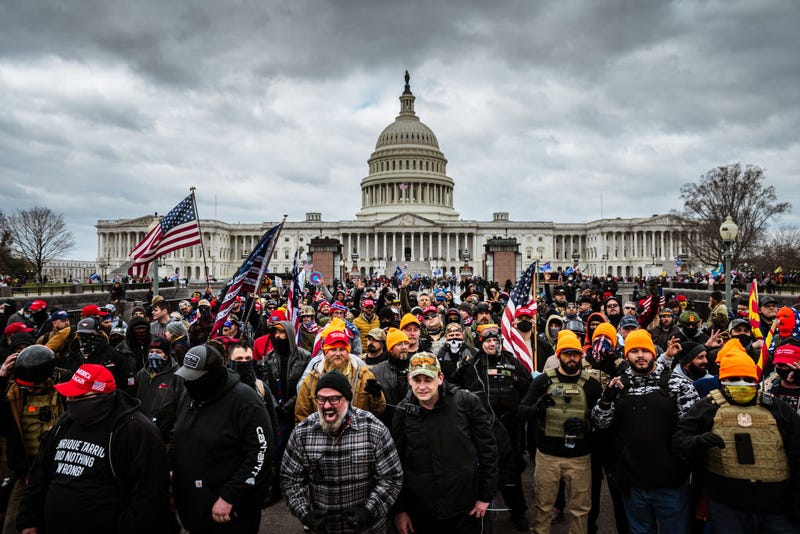
PHILADELPHIA (KYW Newsradio) — The former president of the Philadelphia chapter of the Proud Boys is facing sedition charges in connection with the U.S. Capitol insurrection on Jan. 6, 2021.
Zach Rehl was the president of the local chapter at the time of the Capitol riot. The 36-year-old is currently in federal custody on other charges.
A superseding indictment alleges he was one of a handful of Proud Boys leaders who organized the violence and led the charge into the Capitol.
The 32-page indictment outlines conversations among the group as they organize a new chapter called the Ministry of Self Defense. The indictment says Rehl led operations, and he told prospective members that the Jan. 6 operation will be “completely different,” not just “a night march and flexing our arms.”
It goes on to detail when and how the group crossed police barriers and smashed windows to gain entry to the Capitol.
Rehl’s lawyer, Carmen Hernendez, said the government will have to prove her client “conspire[d] to overthrow, put down, or to destroy by force the Government of the United States,” adding that the indictment does not allege he used force or encouraged anyone else to.
She said adding such a serious charge “without alleging a single new fact” is “simply wrong.” The additional charge could carry 20 years in prison.
Rehl is one of five members named in the indictment. Henry “Enrique” Tarrio, the former Proud Boys chairman, was previously charged with different conspiracy counts, along with Rehl, Ethan Nordean, Joseph Biggs and Dominic Pezzola.
Nordean, of Auburn, Washington, was a Proud Boys chapter president and a member of the group’s national “Elders Council.” Biggs, of Ormond Beach, Florida, is a self-described Proud Boys organizer. Pezzola is a Proud Boy member from Rochester, New York.
The indictment alleges that the Proud Boys conspired to forcibly oppose the lawful transfer of presidential power. They are scheduled to stand trial in August in federal court in Washington, D.C.
The seditious conspiracy charges are among the most serious filed so far but aren’t the first of their kind. Eleven members or associates of the anti-government militia group Oath Keepers, including its founder and leader Stewart Rhodes, were indicted in January on seditious conspiracy charges in a serious escalation in the largest investigation in the Justice Department’s history.
Three Oath Keepers have already pleaded guilty to the rarely used Civil War-era charge, which calls for up to 20 years in prison. The indictment alleges that the Oath Keepers and their associates prepared in the weeks leading up to Jan. 6 as if they were going to war, discussing things like weapons and training.
Tarrio, the group’s top leader, wasn’t in Washington, D.C., when the riot erupted on Jan. 6, but authorities say he helped put into motion the violence that day.
Police arrested Tarrio in Washington two days before the riot and charged him with vandalizing a Black Lives Matter banner at a historic Black church during a protest in December 2020. Tarrio was released from jail on Jan. 14 after serving his five-month sentence for that case.
An attorney for Tarrio said his client is going to have his day in court, “and we intend to vigorously represent him through that process,” said Nayib Hassan.
More than three-dozen people charged in the Capitol siege have been identified by federal authorities as leaders, members or associates of the Proud Boys.
The Proud Boys are a white nationalist hate group, as defined by the Southern Poverty Law Center, a racial justice nonprofit. The Proud Boys describe themselves as a “pro-Western fraternal organization for men who refuse to apologize for creating the modern world, aka Western Chauvinists.”
They have brawled with anti-fascist activists at rallies and protests. Vice Media co-founder Gavin McInnes, who founded the Proud Boys in 2016, sued the Southern Poverty Law Center for labeling it as a hate group.
The indictment alleges that the Proud Boys held meetings and communicated over encrypted messages to plan for the attack in the days leading up to Jan. 6. On the day of the riot, authorities say Proud Boys dismantled metal barricades set up to protect the Capitol and mobilized, directed and led members of the crowd into the building.
Prosecutors have said the Proud Boys arranged for members to communicate using specific frequencies on Baofeng radios. The Chinese-made devices can be programmed for use on hundreds of frequencies, making it difficult for outsiders to eavesdrop.
Shortly before the riot, authorities say Tarrio posted on social media that the group planned to turn out in “record numbers” on Jan. 6, but would be “incognito” instead of donning their traditional clothing colors of black and yellow.
Around the same time, an unnamed person sent Tarrio a document that laid out plans for occupying a few “crucial buildings” in Washington on Jan. 6, including House and Senate office buildings around the Capitol, the indictment says. The nine-page document was entitled “1776 Returns” and called for having as “many people as possible” to “show our politicians We the People are in charge,” according to the indictment.
A New York man pleaded guilty in December to storming the U.S. Capitol with fellow Proud Boys members. Matthew Greene was the first Proud Boys member to publicly plead guilty to conspiring with other members to stop Congress from certifying the Electoral College vote. Greene agreed to cooperate with authorities investigating the attack.
Another Proud Boy, Charles Donohoe, of Kernersville, North Carolina, pleaded guilty in April to conspiracy and assault charges and also agreed to cooperate in the Justice Department’s cases against other members of the extremist group.
In December, a federal judge refused to dismiss an earlier indictment charging alleged leaders of the Proud Boys with conspiring to block the certification of Biden’s electoral college win. U.S. District Judge Timothy Kelly rejected defense attorneys’ arguments that the men were charged with conduct that is protected by the First Amendment right to free speech.





